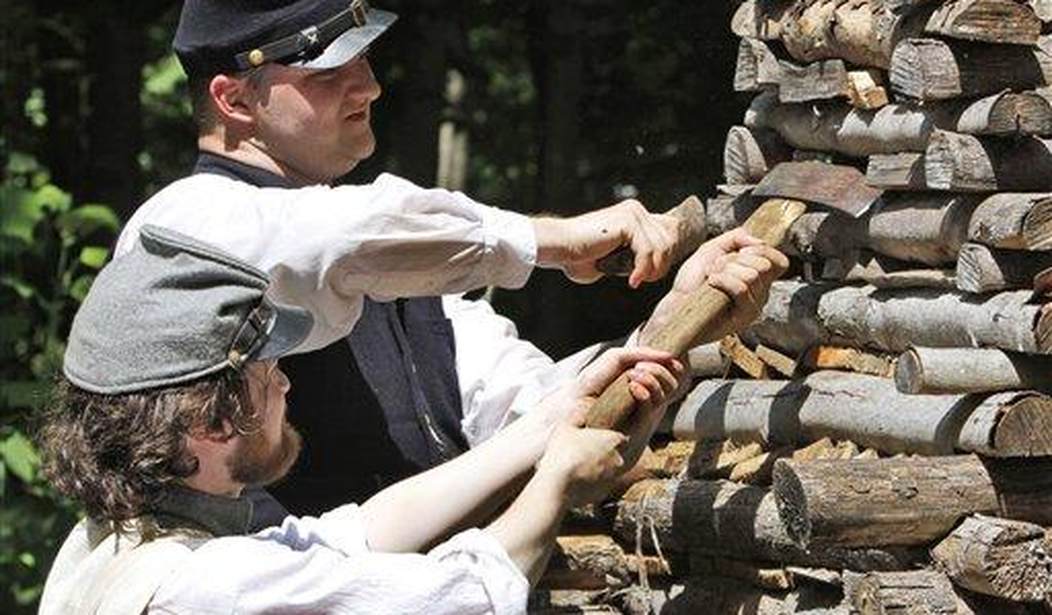Forty years ago, I took the opportunity to attend the 120th anniversary of the Battle of Gettysburg. I never saw the Civil War in quite the same way ever again.
There were dozens of events during the three days the commemoration ran, the highlight being the re-enactment — a spirited affair featuring around 10,000 men in full, authentic Civil War dress firing off muskets. We couldn’t see much through all the smoke, but we could follow the flags as they swayed back and forth, the cannon booming and the blood-chilling “rebel yell” heard above the din of battle.
The re-enactment took place on private property adjoining the Gettysburg National Park — the 160-acre Daniel Lady Farm. In fact, no battlefield re-enactments have taken place on national park property since the 1960s.
But lately, states have taken to banning re-enactments for a variety of reasons. Banning the use of guns on park property prevents even simple firearms demonstrations to be held. There have also been questions about re-enactments between whites and Native Americans. In some cases, Native American participants have been few and far between.
The Wall Street Journal details some of the pressure being placed on these amateur re-enactors.
In September, several groups canceled re-enactments in New York after the state banned weapons, including rifles that fire black powder, from public parks and other areas. Last May, dozens of people in Maine protested Civil War re-enactors carrying Confederate flags in a Memorial Day parade.
Mary Koik, a spokeswoman for the American Battlefield Trust, which tries to preserve historic battlefields from being lost to development, said the shift away from simulated combat on federal land started in the early 1960s after people portraying Confederate and Union soldiers were injured at Gettysburg.
“At least two people were hospitalized,” she said. “There was an about-face on policy.”
The problem today is the dwindling number of people willing to throw themselves into the re-enactor life. It’s more than just a hobby for many of these men and women. They camp out for days on the battlefield and pride themselves on the authenticity of their dress and kit. They actually live like people 160 years ago lived. They use the same cookware, eat the same food, use the same weapons, and try to be as authentic as possible. There’s an entire industry that caters to re-enactors who manufacture and restore authentic supplies.
As you might expect, the number of re-enactors is dwindling. The 10,000 re-enactors I saw in Gettysburg in 1983 have dwindled to about 1,500 today. Kirk Davis, president of the Gettysburg Battlefield Preservation Association, says “It’s now moving more to a living history process.”
And the ever-more restrictive gun laws in states like New York are punishing re-enactors for no reason. The New York law, for instance, has shut down the annual Angelica Civil War Re-enactment, and participants could be arrested for showing up with their black powder guns.
“Black powder weapons are not excepted from this ban,” the group stated. “After obtaining a legal opinion, it was determined that we could not continue with holding the event this year. Participants could be subject to arrest. So the event is canceled this year. If the law is modified or overturned we hope to return in the future.”
The law also has “prohibitions against possession of many types of firearms in ‘sensitive locations’ which include streets, sidewalks, parks and most public locations.”
Under the law, which went into effect Sept. 1, sensitive areas include all public parks with few exceptions, and all private property without expressed permission. Exemptions exist for current and retired law enforcement, peace officers, licensed security guards, active duty military personnel, individuals engaging in hunting activity, persons operating programs in their homes that would otherwise be considered a sensitive location, and government employees involved in natural resource protection.
No carve-outs in the law appear to exist for ceremonial purposes — such as honor guards on Memorial Day or Veterans Day — or demonstrations and activities like Civil War reenactments.
We gain nothing from these self-defeating laws, and a value cannot be placed on what we lose. It’s very easy while attending one of these re-enactments to imagine yourself back in 1863. And if you can do that, you can begin to put yourself in the time and place of those young men and try to understand what they believed and why.
To me, this is the ultimate attraction of reading history. Whose side would you have been on in the Civil War? Why? Your life would have been lived very differently 160 years ago. How would that have changed you?
Dig deeper and ask whose side you might have been on during the revolution. Would you have seen the rebels as heroes? Villains?
These are not easy questions. And reenactments help us clarify our own feelings about history. For whatever reason, they’re being canceled, and we’re losing a valuable asset in our fight to know and understand where we came from and where we might be going.










